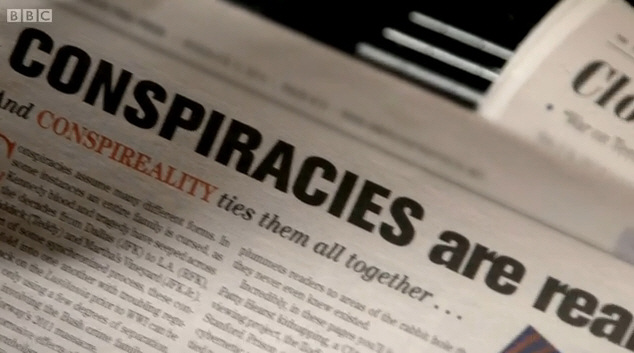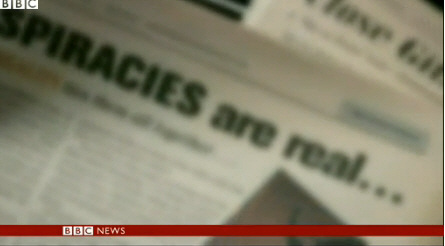DB has done an excellent job in the previous post, I’m just going to add to that….
The BBC messed up. It badly, very badly wanted the Boston bombers to be white right wingers. They went so far as to claim, completely without evidence, that this was indeed the most likely scenario.
They were wrong.
But they are now attempting to rewrite history…not only to cover up the corruption of their own journalistic ethics but to hide the true catalyst that incited the Boston bombs…Islam.
The BBC’s Panorama programme claims to have connected the bombers to white supremacist’s supposed ideology…..and just about every news outlet, website and blog has picked up on this story and regurgitated it without thought or criticism….that is the power of the BBC to distort and manipulate the news and people’s views of the world.
As said the BBC is rewriting history and trying to change perceptions using what is essentially a fabricated story…a complete invention with regards to the meaning of this material and the causes of the bomber’s radicalisation.
The BBC’s Hilary Andersson reported this morning on Today (08:04)that:
‘The BBC’s discovery of the bomber’s interest in radical right wing ideas indicates he was not perhaps so much a radical jihadist but an angry young man who latched onto Islam.’
Let’s look at that last phrase for a start:
‘…an angry young man who latched onto Islam’
Was that Andersson’s own phrase…did she come to that conclusion by looking at the ‘BBC’s discoveries’ of his reading material?
No….in her own web article she tells us exactly where that phrase came from:
‘A spokesperson for Tamerlan’s mosque in Cambridge, Nicole Mossalam, said Tamerlan only prayed there occasionally. She portrayed him as an angry young man who latched onto Islam.’
In other words Andersson is peddling Muslim propaganda as her own conclusions.
Let’s now look at that White supremacist right wing literature…..
Here’s how Andersson starts off:
One of the brothers suspected of carrying out the Boston bombings was in possession of right-wing American literature in the run-up to the attack, BBC Panorama has learnt.
Tamerlan Tsarnaev subscribed to publications espousing white supremacy and government conspiracy theories.
Note that ‘in the run up to the attack’ thereby closely associating the attack with this literature….but just how long had he had it…did he suddenly start reading it and become radicalised? Because that is exactly what Andersson is suggesting by writing in that manner.
She goes on to tell us:
The programme discovered that Tamerlan Tsarnaev possessed articles which argued that both 9/11 and the 1995 Oklahoma City bombing were government conspiracies.
Is that really right wing…the conspriracy theories about 9/11 are mostly left wing and Islamic….‘It was the Jews’
What about 9/11? Definitely those damn Yehudis. I mean, why else were 4,000 Jews in New York told to stay home from work on the morning of 11 September 2001?
Another quote from Andersson:
Another in his possession was about “the rape of our gun rights”.
In his possession…but what was the context….in which publication was this material published? Was it in a gun magazine? Something that came as a package? So maybe not actually of interest to him as an article.
Andersson tells us that there was…
Reading material he had about white supremacy commented that “Hitler had a point”.
Really?
A point about what exactly? Anti-Black racism in the US? Isn’t that what we mostly associate white supremacists with over the Pond? So the Boston Bombers were targeting black people?
Does Andersson not want to mention ‘the Jews’ in case we start to get the real picture?
‘It pains me to have to admit this but anti-Semitism isn’t just tolerated in some sections of the British Muslim community; it’s routine and commonplace. Any Muslims reading this article – if they are honest with themselves – will know instantly what I am referring to. It’s our dirty little secret.’
No Muslim of course wants to wipe out the Jews do they? Let’s see what the BBC favourite Muslim scholar, moderate and respected throughout the Muslim world (and one of the ‘experts’recommended by the BBC’s John Bowker should you wish to learn more about the true Islam and ‘What Muslims Believe’) has to say about Jews and Hitler:
January 30, 2009:
‘Throughout history, Allah has imposed upon the [Jews] people who would punish them for their corruption. The last punishment was carried out by Hitler. By means of all the things he did to them – even though they exaggerated this issue – he managed to put them in their place. This was divine punishment for them. Allah willing, the next time will be at the hand of the believers.’
So perhaps the Tsarnaev brothers were reading material that suggested ‘Hitler had a point’ because they agreed with it…it tied in with their own Islamic beliefs.
But then Andersson gets to the truth:
There was also material about US drones killing civilians, and about the plight of those still imprisoned in Guantanamo Bay.
The Tsarnaev brothers, ethnic Chechens, spent their early years moving around a troubled region of Russia torn by a violent Islamic insurgency.
The brothers’ friends told us Tamerlan turned against the country and became passionate about Islam after becoming frustrated when his boxing career faltered because he did not have American citizenship.
“He (Tamerlan) just didn’t like America. He felt like America was just basically attacking all Middle Eastern countries…you know trying to take their oil.”
Dzhokhar Tsarnaev, Tamerlan’s younger brother who has been charged with the bombings, scrawled a note shortly before his capture stating “We Muslims are one body. You hurt one you hurt us all.”
The brothers had been reading militant Islamic websites before the bombings.
The FBI has been investigating the brothers, and possible connections Tamerlan might have had in the troubled Russian republic of Dagestan which he visited last year.
The House Intelligence Committee in Washington is being briefed on his connections.
The committee chairman, Mike Rogers said he believes the brothers’ mother, Zubeidat Tsarnaev, was involved in his radicalisation.
“He had family members encouraging, we know that for sure,” he said.
So despite all the evidence that points clearly towards the bombings being carried out in the name of Islam the BBC has ‘latched onto’ , to coin a phrase, some literature which it claims is right wing supremacist but is in fact perfectly in line with Muslim thinking.
Thanks to George R for this:
‘The whole of Boston was jihad. Dzhokhar Tsarnaev said the bombing was “violence designed to terrorize the perceived enemies of Islam”and “when you attack one Muslim, you attack all Muslims. Tamerlan Tsarnaev declared, “I will dedicate my life to Jihad’’. “In telephone conversations he was caught on wiretap discussing jihad with mom (their mom was on the Islamic terrorism watch list as well). Tamerlan Tsarnaev vowed to die for Islam. US officials investigating the case said Dzhokhar Tsarnaev’s answers led them to believe he and his brother were “motivated by a radical brand of Islam.” Both Dzhokhar and Tamerlan had both become devout Muslims. And Dzhokhar uploaded a number of videos promoting jihad in Syria.’
The BBC prefers to play down the Islamic connections and headlines, literally, the white supremacist angle which they have in fact invented.
Andersson’s article and ‘Today’ piece must be one of the most corporate self serving corrupt pieces we have seen for a long time….covering up the BBC’s own failures and prejudices as well as hiding the real cause of the bombings.
The BBC Trust will no doubt recommend she be promoted…..though she obviously had better steer clear of this story from ‘ABC’:
‘Mounting Evidence’ Boston Bombers Involved in 2011 Triple Murder’
Wonder if that makes it into tonight’s Panorama.



